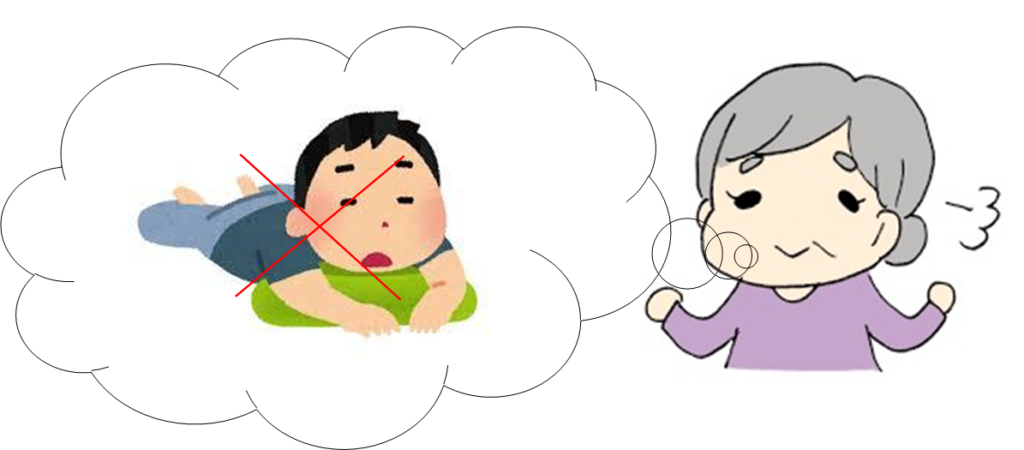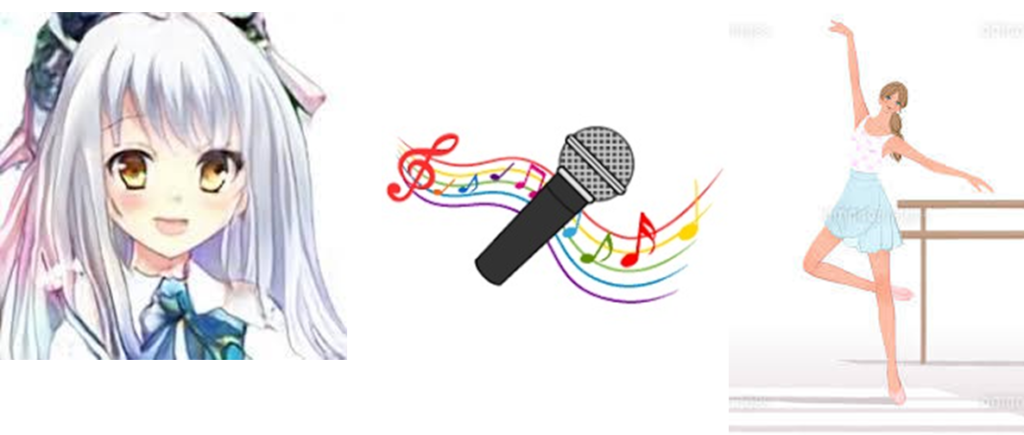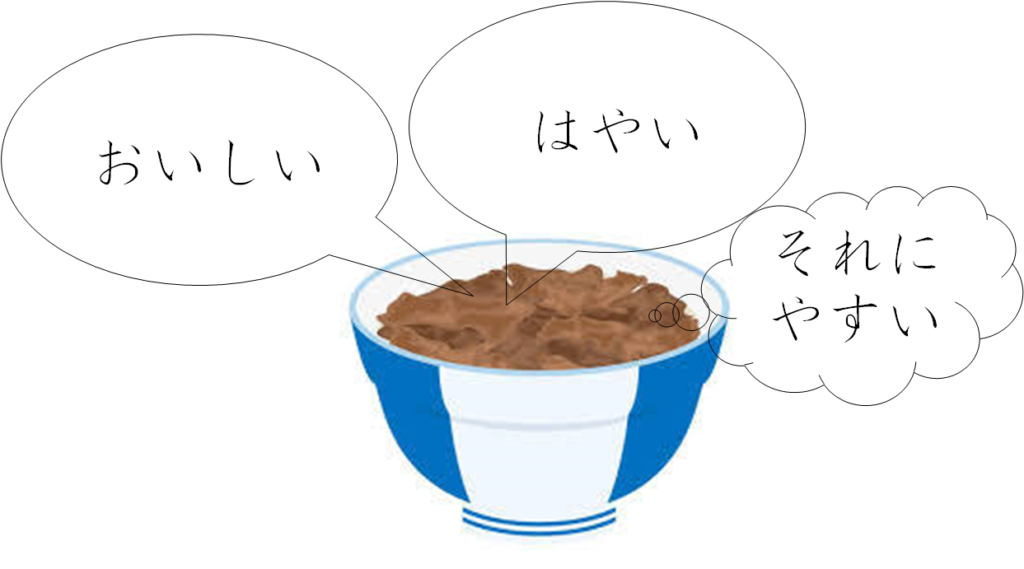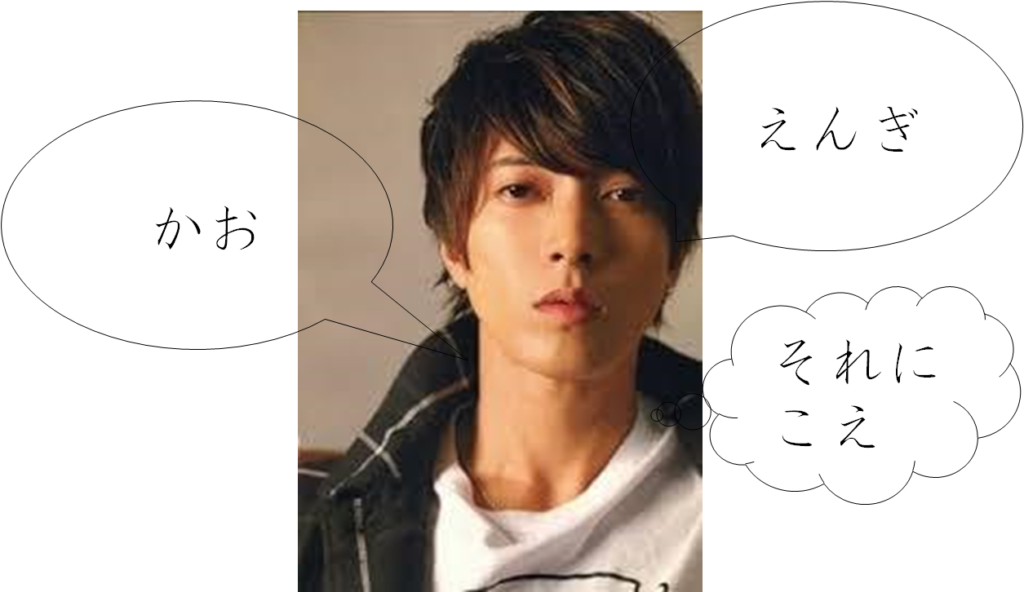目次

(V1ます形) ながら V2
V2 while V1ing
文型-1
Sentence style-1

私は よく 飲みます。
I often drink.
飲むときは よく 話します。
I often talk when I drink.

私は 飲みます。 私は 話します。 いっしょに します。
I drink. I talk. I do each together.
私は 話ながら 飲みます。
I drink while talking.
例文-1
Example-1

私は 昼間は 働いています。
I work during the day.

私は 昼間は 働いています。
I work during the day.
夜になると ブログを 書きます。
I write a blog at night.
私は 働きながら、 ブログを 書いています。
I am writing a blog while working.
例文‐2
Example-2

私は 犬と いっしょに ドライブを します。
I drive with my dog.
ドライブするとき、 音楽を 聞きます。 短くします。
When I drive, I listen to music, Shorten them.
音楽を 聞きながら ドライブします。
I drive while listening to music.
例文‐3
Example-3

彼は 泣いて います。
He is crying.
彼は 食べて います。。
He is eating.
彼は 泣きながら 食べて います。
He is eating while crying.
絵で導入・絵で練習の目次39
「~ながら」もいっしょに読みたい。
(Vて形)います
usually Vte
文型-2
Sentence style-2

朝ご飯は 食べますか。
Do you eat breakfast?
・・・ 食べます。
I eat breakfast every morning.
毎朝 食べて いますか。
Do you eat breakfast?
・・・毎朝 食べて います。
I eat breakfast every morning.
「います」 ⇒ 習慣的にするもの、こと
usually Vte
例文-4
Example-4

学校の 後 何を していますか。
What are you doing after school?
アルバイトを していることが 多いです。
I often work part-time.
たいてい アルバイトを しています。
I usually work part-time.
~て います。
I usually do

休みの日は たいてい サーフィンして います。
I usually surf on my days off.

暇なときは、 庭の 手入れを して います。
In my free time, I usually take care of my garden.

たいてい 電気屋に 行っています。
I usually go to an electric shop.

おばあちゃんは いつも 楽はするな と 言っています。
Grandma always tells me not to relax.

いつも 遅くまで 勉強して います。
I always study until late at night.
(普通形)し、(普通形)し、それに
V/A/Na/N, V/A/Na/N, and
例文-5
Example-5

あの人は どんな 人ですか。
What kind of person is that person?
態度が悪い
bad attitude
偉そう
look arrogant
けち
stingy
あの人は、態度も悪いし、偉そうだし、それにケチです。
He has a bad attitude, looks arrogant, and is stingy.
「<普通形>し、<普通形>し、それに」
“V/A/Na/N, V/A/Na/N, and”
「~し、~し」は話して、「さらに、その上」という付け加えの気持ちを表す。
-Shi-shi expresses the speaker’s feeling of “addition”.
~し、~し、それに
A, B and C

あの歌手は、顔も可愛いし、歌もうまいし、それにダンスもできます。
That singer has a cute face, is good at singing, and can dance.

この車は、自分で動くし、水の中も行けるし、それに飛ぶこともできます。
This car can move on its own, go in the water, and can fly.

このお店は、味が美味しいし、早いし、それに安いです。
This shop has a delicious taste, is fast, and is cheap.

あの俳優は、顔もいいし、演技もうまいし、それに声も素敵です。
That actor has a nice face, good acting, and a nice voice.
(普通形)し、(普通形)し、~(理由の列挙)
A is B and C
文型-3
Sentence style-3

今日も 運動するんですか。
Do you exercise today as well?
気持が いいです。
I feel so good.
ごはんが おいしいです。
The food is delicious.
体に いいし、 ごはんも おいしいし、運動は気持ちいい ですから。
It’s good for your body, the food is delicious, and the exercise feels good.
「<普通形>し、<普通形>し、~」 ⇒ こうなったわけが二つ以上あるときに使う。
“V/A/Na/N, V/A/Na/N”
It is used that there are multiple reasons for reaching a certain conclusion.
例文-6
Example-6

昼ご飯を 食べないんですか。
Don’t you eat lunch?
きのう、飲みすぎましたし、 食べ過ぎましたから。
Yesterday, I drank too much and ate too much.
どうして~んですか。(普通形)し、(普通形)し、~から
Why~? Because it’s ~ and ~.
例文-7
Example-7

どうして そんなに 若いんですか。
Why are you so young?
悩みが ありませんし、 好きことを やっていますから。
I don’t have any worries and I’m doing what I like.
「<普通形>し、<普通形>し、~から」 ⇒ 理由を言うときに、結論を言わずに、「から」の理由だけで終わらせることが出来る。
When you say the reason, you can end it with “kara” without saying the conclusion part.

どうして そんなに 元気なんですか。
Why are you so fine?
・・・ よく寝ますし、 よく食べますから。
I sleep well and eat well.
ことばを覚えよう。

漢字の練習をしよう。

文の形を覚えよう。

耳で覚えよう。

日本語教師 教師用教案


コメント